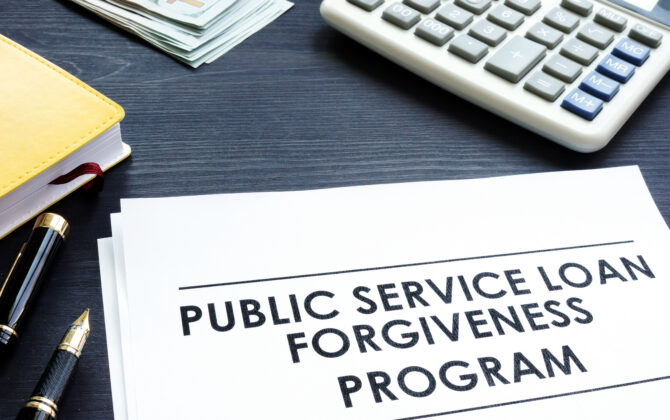In addition to making monthly student loan payments and keeping up with frequent changes to repayment programs and their requirements, the nation’s approximately 44 million federal student loan borrowers must also be vigilant about protecting themselves against student loan forgiveness scams.
Unfortunately, student loan forgiveness fraud is a costly and growing problem – scammers have victimized tens of thousands of borrowers around the US. In recent years, the Federal Trade Commission (FTC) has refunded over $10 million to more than 50,000 victims of multiple scams related to student loan forgiveness.
Unlike Laurel Road’s Public Service Loan Forgiveness (PSLF) and Income-Driven Repayment (IDR) membership services – which help borrowers through expert student loan analysis, guidance on program requirements, and support tracking payments for the duration of the borrowers’ enrollment in their chosen forgiveness program – the “services” being sold by fraudsters typically involve promises of instant or complete student loan forgiveness.
As a federal student loan borrower, it’s critical to know the red flags of a student loan forgiveness scam – and how to protect yourself – so you don’t become a victim.
Types of student loan forgiveness scams
Student loan scammers commonly try to contact borrowers through emails, text messages, or phone calls. Reports of student loan fraud typically surge around the time of new announcements and changes in student loan policy, as scammers seize the opportunity to take advantage of confusion among borrowers.
In the Fall of 2023, for example, over 350,000 robocalls related to student loans were reported amid news about the student loan payment and interest pause ending, as well as changes to the Income-Driven Repayment (IDR) program.
Scammers may pose as a new student loan servicer, an affiliated company, or the federal government. Fortunately, there are a few details you can look for that should immediately tip you off to a student loan forgiveness scam.
How to identify student loan forgiveness fraud
Some student loan scam red flags can be more obvious than others. Here are five things to look out for:
Typos in messages
Aggressive advertising language
Demands for up-front payment
Demands for third-party authorization or power of attorney
Requests for your Federal Student Aid (FSA) ID
Typos in messages
Misspellings, grammatical errors, and odd language within emails and text messages are one of the most obvious signs it came from a scammer. Also, take a closer look at the senders’ email address – scammers often change one character of a legitimate, familiar domain name to make their email address appear authentic at first glance.
Aggressive advertising language
Promises like “immediate”, “guaranteed”, or “total” student loan forgiveness – or other over-promissory language – are often surefire signs of a scam. The federal government’s student loan repayment and forgiveness programs take many years of repayment and other qualifying criteria. Debt relief companies are unable to skirt these rules or remove debts from your credit report that you legally owe. Additionally, urgent language such as “limited time deal” or “act immediately” could be signs of a scam as well.
Demands for up-front payment
Scammers may ask for your credit card number before explaining exactly how they’ll help you. If a company requires you to pay an up-front fee immediately or tries to make you sign a contract on the spot, it’s more than likely a scam.
Demands for third-party authorization or power of attorney
These are written agreements giving a person or company legal permission to talk directly to your student loan servicer and make decisions on your behalf. Beware of any company that interferes in communication between you and your servicer. In some cases, they may even ask you to pay them directly, promising to pay your servicer each month when your bill is due.
Requests for your Federal Student Aid (FSA) ID
If you give away your FSA ID (your unique username and password), then you are giving a person or company the power to perform actions on your student loan(s) on your behalf. The Department of Education or your servicer will never ask for your FSA ID or password.
How to protect yourself from student loan scammers
Once you know what the red flags of student loan fraud are and how to spot them, here are some steps you can take to do your due diligence.
- Do not share your FSA ID with anyone. Protect this information the same way as you would your banking information.
- Check Better Business Bureau®. If something about the company that’s contacting you seems off, check to see if there are any complaints.
- Stay in communication with your servicer. You should be involved in any communications with your servicer, including the completion of any paperwork to change your repayment plan. However, if you’re enrolled in the Public Service Loan Forgiveness (PSLF) or Teacher Education Assistance for College and Higher Education (TEACH) Grant program, note that your loans will no longer be managed by designated servicers as of May 1, 2024. Student loans belonging to borrowers in these programs will be directly managed through studentaid.gov. See more information here.
- Verify email senders’ identity. Scammers often try to appear legitimate by using official sounding names, logos, or websites. If you’re contacted by a company claiming to be your new loan servicer, verify their legitimacy. If they claim to be affiliated with the Department of Education, here’s what to look for.

Note that just because the person contacting you might have correct information about you or your loan, that doesn’t mean they’re legitimate.
Verifying student loan servicer communications
Loans made by the US Department of Education (ED) are serviced by 7 contracted loan servicers. Review this list of contracted federal student loan servicers to make sure the company is a legitimate entity.
- Aidvantage (StudentAid.gov)
- CRI (StudentAid.gov)
- Default Resolution Group (ed.gov)
- ECSI (ed.gov)
- Edfinancial (edfinancial.studentaid.gov)
- MOHELA (mohela.com)
- Nelnet (StudentAid.gov)
Changes for borrowers enrolled in the Public Service Loan Forgiveness (PSLF) program
Beginning May 1, 2024, the Public Service Loan Forgiveness (PSLF) and Teacher Education Assistance for College and Higher Education (TEACH) Grant programs will no longer be managed through a designated loan servicer. Visit the FSA website for more information.
Verifying communications from the federal government
Emails from the US Department of Education come from .gov email addresses:
Official texts from Federal Student Aid only come from 227722 and 51592.
Note that if you’re looking to consolidate your student loans or change repayment plans, the process should happen through one of the government’s official loan servicers or websites ending with “.gov”. See more information about verifying communications from Federal Student Aid here.
Identifying communications from Laurel Road and GradFin1
Laurel Road and our GradFin team of student loan specialists offer one-on-one guidance to help student loan borrowers better understand their student loan options and eligibility for forgiveness programs. An important distinction is that we do not “provide” student loan forgiveness or debt relief; rather, we work with borrowers to provide an expert analysis of their student loans and design a student loan management plan that aligns with their unique financial goals. That means borrowers can save time, stress less about student loan debt, and feel confident that they’re on the best path for them.
Because federal student loan repayment and forgiveness programs have notoriously complex requirements that often change – and because borrowers will typically have to meet those requirements for a decade or more in order to remain eligible for forgiveness – we offer eligible borrowers an annual subscription membership service for continued guidance and account auditing, year after year. Our PSLF Membership and IDR Membership programs help eligible borrowers save time and can provide financial peace of mind.
Legitimate email communications from Laurel Road and GradFin will only come from email addresses ending in “laurelroad.com” or “gradfin.com”.
Laurel Road and GradFin will:
- NEVER ask for you FSA ID, Social Security Number, bank account information, or request to sign into any of your accounts on your behalf.
- NEVER receive or make student loan payments for borrowers.
- NEVER sign any applications on behalf of borrowers.
- NEVER call and ask for membership payments over the phone. Our members sign up for our annual subscription membership service online only.
- NEVER cold-call you or use a robocall to contact you. To initiate a phone consultation with a student loan specialist, you will need to use our online scheduler.
- NEVER promise immediate and/or total student forgiveness. Instant and total forgiveness simply do not exist through the federal forgiveness programs that we help members navigate. Our IDR and PSLF membership programs help members understand what they need to do to meet the requirements of a forgiveness program, over the 10 – 25 years they’re enrolled.
Keeping our members’ personal information and data secure is our highest priority, and we take several measures to ensure protection. For authentication purposes, our student loan specialists may ask for your email, mailing address, or date of birth. And we will only request documents via a secure communication channel such as our membership portal.
What should I do if I think I’ve been the victim of student loan fraud?
If you think you’ve been the victim of student loan forgiveness fraud, here are steps you can take.
Change your FSA ID immediately
If your studentaid.gov account has been compromised or if you’ve shared your FSA login details with someone whom you now suspect to be a scammer, log in and change your account password as soon as possible.
Contact your federal loan servicer
Make sure no unwanted actions were taken on your loans. Work with them to revoke any authorization agreement that your servicer has on file.
Stop payment
Contact your bank or credit card company to stop all payments to the company that is scamming you. Your bank should have policies in place to help you avoid future fraudulent activity.
File complaints with appropriate authorities
Contact the Federal Trade Commission, Consumer Financial Protection Bureau, and your state officials such as the Attorney General in your state and your state student loan ombudsman if you have one.
Stay vigilant against student debt forgiveness scams
Student loan fraud activity tends to ramp up whenever the government makes new student loan-related announcements or changes to federal repayment and forgiveness programs.
Stay up-to-date on the latest information on the studentaid.gov website, or if you have questions about how announced changes might affect your student loans or impact your eligibility for forgiveness, schedule a call with one of our student loan specialists who have expertise in ongoing student loan landscape changes and can help you understand what they mean for you.




